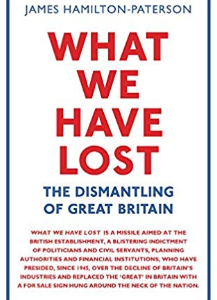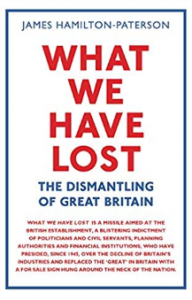
The dismantling of Great Britain

Britain’s Glorious past and fall from grace featured by James Hamilton-Paterson, including Scotch Whisky, Triumph, who incidentally owned by industrial conglomerate BSA, who once provided motorbike for Steve McQueen, in The Great Escape and Marlon Brando in The Wild One, is to become one of the leading players in Britain’s flourishing motorbike industry, which was said to provide the bulk of the country’s earnings in the late 1960s. Yet by middle of next decade BSA was bankrupt due to mismanagement industrial strife and overseas competition from the Germans and Japanese. Although Triumph workers took over the factory as an alternative to closure and ran as co-operative until government funding dried up in 1983. In a blistering indictment of politicians and civil servants, planning authorities and financial institutions who have presided since 1945, over the decline of Britain’s industries and replace the Great in Britain with a for sale sign hyng around the neck of the nation.
In his tour of British factories, nuclear power station, shipyards, where everything was made in Britain and British technology seemed to reign the world , to disappear.
In this era of Brexit, many seemed to wish not for an independent future but for return to the certainties of the past, and according to Hamilton-Paterson this kind of thinking is dangerous and must be clipped of its “imaginary components”.
The management of British motorcycle industry failed to foresee serious competition from Germans and Japanese or to produce lighter, more easily maintained vehicles like Italian Vespa.
He blames Britain’s inability to plan for the future. Between 1939 and 1945 Britain produced around 125, 000 aircrafts, several ships, motor vehicles, steel, radar, antibiotics, the jet engine, the computer, armaments and textiles. Less than seventy years later, the major industries that had made Britain a global industrial power, who employed millions of people were dead. James Hamilton-Paterson, analyses the factors that contributed so quickly from a nation of active producers to one of passive consumers and financial middleman.
Hamilton-Paterson spent much of his life shunning the UK, in a rare profile in The Guardian, fourteen years ago, he spoke of leaving Britain over a quarter of century earlier and dividing his time between Tuscany and the Philippines.
He reviews the Network Rail’s dithering failure to get on with electrifying the Great Western main line, the failure of Concorde and the procrastination over adding runways to London’s airports. A combination of appalling mismanagement, personal rivalries, union intransigence and stupidity was to bring this lively industry to its knees.
In Britain, the 1960s were an era of incompetent economic management, with the long fight to fend off devaluation and incessant industrial unrest. He praises Thatcher, for her greatest achievement for curbing the power of the trade unions.
What We Have Lost: The Dismantling of Great Britain by James Hamilton-Paterson, Head of Zeus £25, 360 pages.
